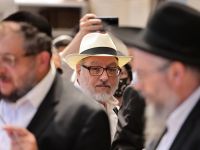Pope John Paul began a pilgrimage to Syria on Saturday with a call to all feuding parties in the Arab-Israeli conflict to seek a lasting peace in the troubled Middle East.
"As the word peace echoes in our hearts, how can we not think of the tensions and conflicts, which have long troubled the region of the Middle East?" the Pontiff said at a welcoming ceremony attended by Syrian President Bashar al-Assad.
"It is time to return to the principles of international legality: the banning of the acquisition of territory by force, the right of peoples to self-determination, respect for the resolutions of the United Nations Organization and the Geneva conventions," the 80-year-old Pope said, quoted by Reuters.
Pope John Paul arrived in Damascus on the second leg of a six-day tour to retrace the steps of St Paul in Greece, Syria and Malta.
"My pilgrimage is also an ardent prayer of hope: hope that among the peoples of the region fear will turn to trust; and contempt to mutual esteem; that force will give way to dialogue; and that a genuine desire to serve the common good will prevail," the Pontiff said, quoted by the agency.
The pontiff will issue an appeal for peace in the Middle East from the Golan Heights city of Quneitra, which Israel occupied in 1967 and returned under a US-negotiated agreement in 1974.
The pope arrived in Syria, coming from Greece where he will speak to Greece's small Catholic community after appeasing the prickly Greek Church with a plea for divine forgiveness for 1,000 years of Catholic sins against the Orthodox, said Reuters.
After four days in Syria, the pope will wrap up his trip with a stop in predominantly Catholic Malta, presiding at a beatification ceremony for two Maltese priests and a nun.
The pope's visit to Syria was hoped to help cool down a heated dispute between Christian Lebanese and Syria over the presence of the latter's troops in the neighboring country.
But Lebanon's Maronite Patriarch Nasrallah Sfeir announced on Wednesday that he will not accompany Pope John Paul II on the latter's historic trip to Syria, citing the "political character" the visit has assumed.
The decision came in a statement issued following the Council of Maronite Bishops' monthly meeting to consider church matters and the current situation in the country and the region as a whole.
The statement said the pope's planned tour of Greece, Syria and Malta was welcomed, appreciated and a cause for satisfaction, but regretted that Sfeir would not be able to participate.
"It was the patriarch's intention," the statement explained, "to participate in celebrations accompanying the visit had it not been for the political character it assumed in Lebanese public opinion, making an 'issue' out of it that departed from its pastoral nature.
"This is deeply regrettable," said the statement, cited by the paper.
Sfeir has been leading a campaign demanding the end of Syria's military presence in Lebanon.
A number of politicians had encouraged Sfeir's participation in welcoming the pope to Damascus, in a bid to improve relations between the two countries - Albawaba.com
© 2001 Al Bawaba (www.albawaba.com)







